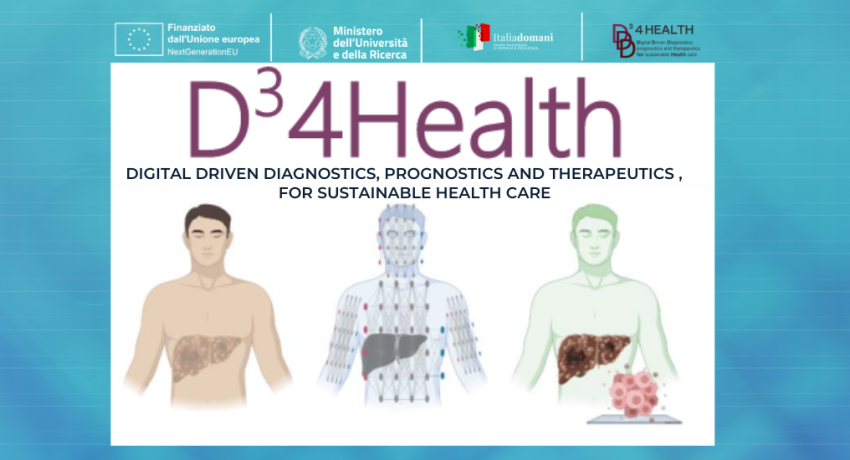
Progetto: D3-4-Health
«Digital Driven Diagnostics, prognostics and therapeutics for sustainable Health care»
DD MUR n.931 del 06/06/2022
• Finanziamento di «Iniziative» di ricerca con l’obiettivo di mettere a sistema, in chiave innovativa, il potenziamento della ricerca sulle tecnologie abilitanti in ambito sanitario, al fine di migliorare la diagnosi, il monitoraggio e le cure, incluse quelle riabilitative.
- 4 Spoke
- 5 Patologie
- Durata: 48 mesi
- Data inizio progetto: 1 dicembre 2022
- Coordinatore Scientifico: Prof. Catalano, Sapienza
Delegato della Rettrice alla Digitalizzazione e alle tecnologie innovative per la medicina e per la ricerca biomedica
Aim: The overall objective of the D3 4 HEALTH project is to deliver highly technological solutions that will impact the management of the reference disease.
Abstract:
Clinical data will be used and integrated, when appropriate, with the data generated by the mathematical algorithms for a better characterization of the studied populations. The collected data will feed the deployed GDPR-compliant multilayer platform. Mathematical and statistical methods will be employed for the analysis and interpretation of data from OOCs and organoids developed by experimentalists for the construction of Digital Twins.
We will produce innovative solutions for early detection, monitoring and treatment of the reference pathologies including wearable technologies, sensors and biomarkers supported by digital tools. Forecasts from these analytical models, under diverse pathophysiologic hypotheses and across several therapeutic schemes, will immediately provide decision support to clinicians and also point to potentially fruitful, directed investigations either by statistical re-evaluation of available large datasets, or by patient-specific non-standard diagnostic maneuvers.Such solutions will likely relieve the burden on the national health systems (NHS) by promoting early detection, home monitoring and early assessment of response to therapy.
The overall objective of Spoke 3 is the development of new wearable technologies, sensors and biomarkers to deliver accessible and affordable diagnostic, monitoring and therapeutic pathways for metastatic colon cancer (P1), liver and bile duct cancer (P2), central nervous system cancer (P3), diabetes type I (P4), multiple sclerosis (P5) i.e. reference pathologies. D3-4-HEALTH will transform and advance current methodologies for the management of the reference pathologies facilitating the application of precision medicine approaches through novel AI-powered algorithms, mathematical models and medical devices for the benefit of patients, throughout the national territory. It is now concretely possible to take advantage of devices, mathematical models, AI-powered algorithms, biomarkers, but also of results on organs-on-chips (OOCs) and organoids obtained by means of ad-hoc designed laboratory experiments, for diagnosis of chronic diseases, for monitoring and prevention of disease acute and chronic disease complications and for therapeutic decision making and assessment of response to therapy.
CNR is:
- co-leader of Spoke 3: WEARABLE TECHNOLOGIES, SENSORS AND BIOMARKERS FOR CARE THROUGH
DIGITAL TWIN APPROACHES
and
- co-leader of Spoke 4: BIOLOGICAL AND BIOENGINEERED IN VITRO MODELS FOR CARE THROUGH
DIGITAL TWIN APPROACHES.
Involved CNR Institutes (Dip. DIITET-DSFTM-DSB): Spoke 3: IAC (Roma and Napoli), IASI, IMATI (Pavia), ICAR, ISC
Spoke 4: IRIB, IN, IGB, NANOTEC, IFN, ISC, IBF
Principal Investigators IAC-CNR: Gabriella Bretti, Annamaria Carissimo.
Altri partner:
Università degli Studi di Roma Sapienza, Università degli Studi di Salerno, Università degli Studi di Napoli, Università degli Studi di Bologna, Università degli Studi di Milano, Università degli Studi di Siena, Università degli Studi di Bologna, Università degli Studi di Torino, Politecnico di Torino, Politecnico di Bari, Università degli Studi del Molise, Università degli Studi "Magna Græcia" di Catanzaro,
IRCCS Ospedale Pediatrico Bambino Gesù, IRCCS Ospedale San Raffaele, IRCCS Istituti fisioterapici Ospitalieri - Istituto Tumori Regina Elena e Istituto Dermatologico San Gallicano, IRCCS Istituto di Candiolo, IRCCS Ospedale Sacro Cuore Don Calabria, IRCCS Istituto Neurologico Mediterraneo Neuromed, Istituto Superiore di Sanità, IRCCS Istituto di Ricovero e Cura a Carattere Scientifico, Azienda Sanitaria Locale di Nuoro, CINECA,
IRCCS Università Vita Salute San Raffaele, Gruppo San Donato, Fondazione Bruno Kessler, Aizoon Group, DGS, PORINI, Istituto Telethon di Genetica e Medicina, Istituto Europeo di Oncologia.
Finanziato dal Piano complementare al Piano Nazionale di Ripresa e Resilienza.







